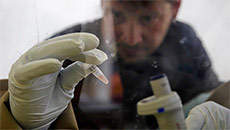Bacteria that metabolise ammonia - a major component of sweat - may improve skin health and some day could be used for the treatment of skin disorders such as acne or chronic wounds, shows new research.
Human volunteers using the bacteria reported better skin condition and appearance compared with a placebo control group, said researchers after the study.
For the study, researchers used a strain of Nitrosomonas eutropha -- ammonia-oxidising bacteria (AOB) isolated from organic soil samples.
In the placebo-controlled study involving 24 volunteers, one group applied a suspension of the live bacteria on their face and scalp for one week while a second group used placebo.
Both groups were followed for an additional two weeks.
The AOB users reported qualitative improvements in skin condition compared with no or minimal improvement reported by the control group.
"The use of a bacterial DNA detection assay demonstrated the presence of AOB in 83-100 percent of skin swabs obtained from AOB users but not in any of the placebo control samples," said Larry Weiss, chief medical officer at AOBiome, a biotech start-up in Cambridge, Massachusetts.
Importantly, there were no adverse events associated with the topical application of AOB.
AOB are ubiquitous in soil and water and are essential components of the nitrogen cycle and environmental nitrification processes.
"Live Nitrosomonas are well tolerated and may hold promise as novel, self-regulating topical delivery agent of nitrite and nitric oxide to the human skin," Weiss concluded.
The researchers presented the results at the fifth ASM Conference on Beneficial Microbes in Washington, DC recently.





